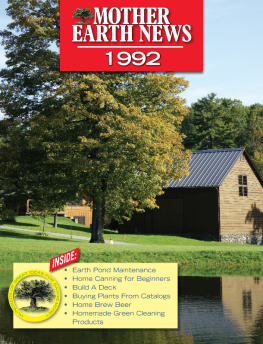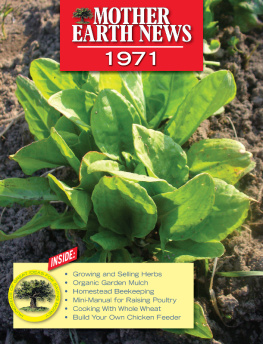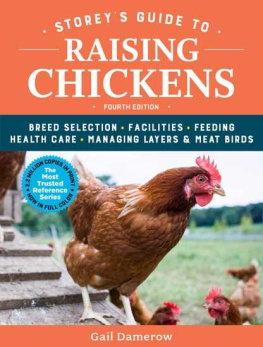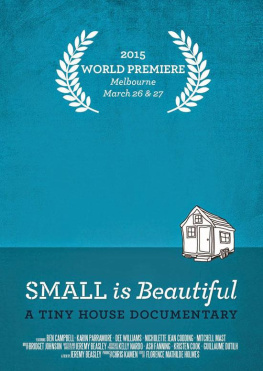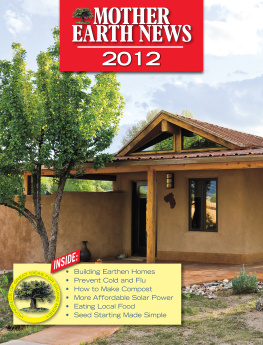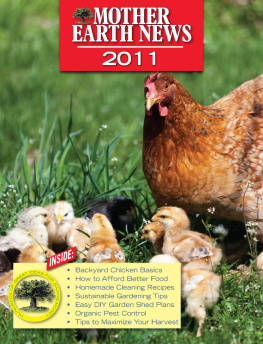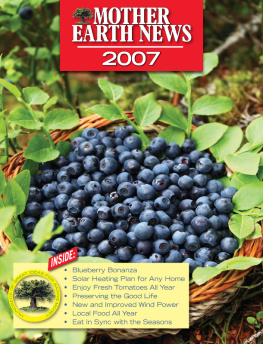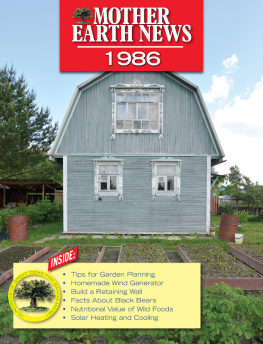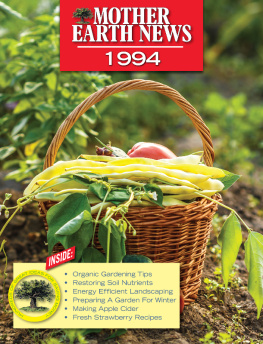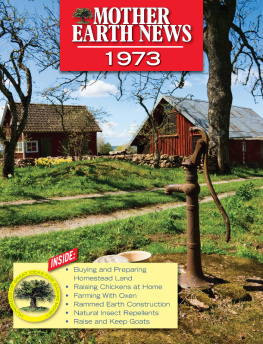Mother Earth News - Mother Earth News 1979
Here you can read online Mother Earth News - Mother Earth News 1979 full text of the book (entire story) in english for free. Download pdf and epub, get meaning, cover and reviews about this ebook. year: 1979, publisher: Mother Earth News, genre: Science / Home and family. Description of the work, (preface) as well as reviews are available. Best literature library LitArk.com created for fans of good reading and offers a wide selection of genres:
Romance novel
Science fiction
Adventure
Detective
Science
History
Home and family
Prose
Art
Politics
Computer
Non-fiction
Religion
Business
Children
Humor
Choose a favorite category and find really read worthwhile books. Enjoy immersion in the world of imagination, feel the emotions of the characters or learn something new for yourself, make an fascinating discovery.
- Book:Mother Earth News 1979
- Author:
- Publisher:Mother Earth News
- Genre:
- Year:1979
- Rating:5 / 5
- Favourites:Add to favourites
- Your mark:
- 100
- 1
- 2
- 3
- 4
- 5
Mother Earth News 1979: summary, description and annotation
We offer to read an annotation, description, summary or preface (depends on what the author of the book "Mother Earth News 1979" wrote himself). If you haven't found the necessary information about the book — write in the comments, we will try to find it.
Mother Earth News 1979 — read online for free the complete book (whole text) full work
Below is the text of the book, divided by pages. System saving the place of the last page read, allows you to conveniently read the book "Mother Earth News 1979" online for free, without having to search again every time where you left off. Put a bookmark, and you can go to the page where you finished reading at any time.
Font size:
Interval:
Bookmark:

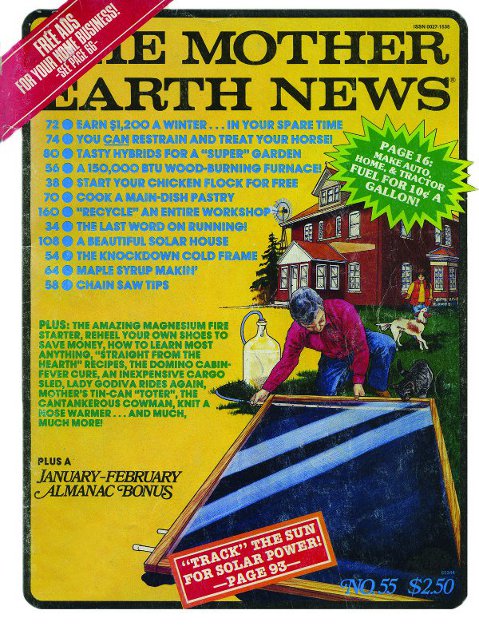
Mr. Lance Crombie of Webster, Minnesota is a farmer he even carries business cards which attest to that fact. Crombie, however, has a number of sidelines that arent exactly typical of a tiller of the soil.
Lance is, for instance, a former cancer researcher who holds a Ph.D. in microbiology, the inventor of a low-cost solar collector, a partner in the firm that distributes his invention, the chairman of the Minnesota State Heart Fund, an associate professor of pharmacy at the University of Minnesota, a member of the New York Academy of Science and hes listed in Whos Who in the Midwest and Outstanding Young Men in the Midwest.
Lance is also a moonshiner.
A moonshiner? Yep, you read it right. You see, Crombie is the kind of guy who gets things done when they need doin, and hes not at all hesitant to buck the system or throw out the accepted answers when he feels that he can find a better solution by himself.
So-when his familys fuel bills became more than their budget could bear, Lance sat himself down, designed a sun-powered still, and began to produce corn alcohol which he planned to use to heat his home and power his farm machinery.
It wasnt long, however, before his experiments brought about a head-to-head confrontation between Crombie and the Treasury Departments Bureau of Alcohol, Tobacco, and Firearms the revenuers.
Surprisingly enough, Lance won that battle (he obtained permission to operate his still) and - in the process - he became a spokesman for the alcohol fuel movement a group of people who feel that our continued dependence upon fossil fuels is the quickest possible route to energy bankruptcy, and that agriculture ought to be given the chance to take a whack at solving Americas fuel problems.
In order to find out more about Crombie, and about alcohols use as a fuel, MOTHER sent staffer Bruce Woods to the Gopher State to interview the Minnesota Moonshiner. While there, Bruce managed to wedge some questions in among the corn combining, volunteer work and alcohol public relations activities that had kept Lance awake for the previous 30 hours.
In this transcript of Bruce and Lances exchange, youll discover that Lance Crombie is - indeed - a farmer but a farmer who - quite possibly - holds the key to individual total energy self-sufficiency in his hands.
Lance, its obvious from everything thats gone on since we arrived at your home - the constant phone calls, the people stopping by for information and advice, etc. - that your distillation experiments have attracted a lot of attention. Just how did a Minnesota corn farmer wind up in the middle of this home-produced alcohol controversy?
Well, to go back to the very beginning, I was born and raised on a dairy farm in North St. Paul, Minn. By the time I got out of high school Id milked one heck of a lot of cows, so I decided to go to college to try my hand at something other than udders for a while. I eventually graduated from the University of Minnesota with a Ph.D. in microbiology and a biochemistry minor. That was in the spring of 1968.
I went into lab work after graduation and was employed for the next few years doing research in the areas of immunization and cancer prevention. It wasnt long, though, before I began to realize that the job market for Ph.D.s was getting pretty glutted there were more people holding the degrees than there were positions for those men and women to fill. So, since I really wanted to get back to farming anyway, I bought a small place here in Webster in 1974. Ive been able to expand it through the years, and now I run a little more than 600 acres of corn and wheat. I plan to switch some of it over to sunflowers next year and then maybe Ill make some money from farming for a change.
And after you returned to farm life you became interested in solar energy?
I had to! You see, while we were adding to our acreage, we lived in a little house. My family was too big to stay in such cramped quarters for long, though, so I looked around and eventually found this monster home here. It had been a parish house, and the church offered it to me for $200 on the condition that I move it.
Everybody I talked to told me that it would be impossible to transport a brick house of this size all the way out here to my property, and I always tend to get a little riled when Im told that somethings impossible. It took me a while, but I finally found a company that was willing to tackle the job. And, although those guys lost money on the contract, the publicity generated by the move brought them a lot of new business.
Anyway, the house became our bicentennial project. We had built a new basement for it before we moved it out here, and we went on to refurbish the whole structure all of which added about $40,000 to the original $200 price tag.
And then the winter of 1976-77 came along. Our heating bill for January alone was over $450, and it had been running right around that figure for months. I didnt have that kind of money to burn. In fact - what with the house expenses on top of several years of non-profit farming - I didnt have much money at all! So I did a little research, gave the problem some thought, and designed an inexpensive, temporary, all-plastic, inflatable solar collector just to help us survive the winter without going broke.
The thing worked fine, too. I mean, it really helped, although we would have needed a number of collectors to heat this house. My brother and I decided that other folks might be interested in a solar heating system that wouldnt cost an arm and a leg to set up, though, so I redesigned the collector - made it more durable - and got a patent on the design. Then we formed a company called Chicago Solar and started traveling to various energy shows to market the units.
Whenever I demonstrated the collector, somebody would be sure to ask me, But what do you do when the sun doesnt shine? After a while I started telling em that Id perfected a method of collecting moonbeams and that Id supply a free bottle of moonshine with every solar collector I sold because I didnt want my customers to get cold at night.
That joke, you see, started the whole alcohol thing because it set me to thinking. My heating bills were still high, of course, and I needed to come up with something I could use to augment our solar heaters or to fill in for them on cloudy days and such.
At the same time, I had about 45,000 bushels of corn sitting out there in my bins. It was worth around $1.60 a bushel on the market, and - since it had cost me almost $2.00 a bushel to grow -- I wasnt about to sell the grain at that price.
So, I put two and two together and decided to turn all that corn into alcohol. I figured that I could use the fuel to heat my house, run my tractors, and all that.
There didnt seem to be much information available on alcohol stills per se, but I managed to find out a good bit about fermentation which is just yeasts and bacterial action, stuff that I was pretty familiar with. So I built a crude little solar still, whipped up a batch of mash, and was ready to go.
Font size:
Interval:
Bookmark:
Similar books «Mother Earth News 1979»
Look at similar books to Mother Earth News 1979. We have selected literature similar in name and meaning in the hope of providing readers with more options to find new, interesting, not yet read works.
Discussion, reviews of the book Mother Earth News 1979 and just readers' own opinions. Leave your comments, write what you think about the work, its meaning or the main characters. Specify what exactly you liked and what you didn't like, and why you think so.


